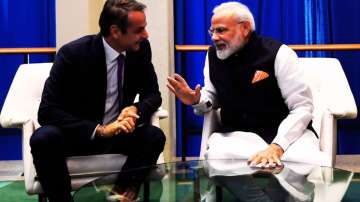Modi becomes first Indian PM to visit Greece in 40 years after Indira Gandhi I Why is this visit crucial?
On Jammu and Kashmir, Greece’s position reflects India's concerns. Unlike the West and other regions of Europe, it has not issued any statement on the recent developments in Kashmir.

Prime Minister Narendra Modi will take off for Greece shortly following his three-day trip to South Africa's national capital, where he attended the much-awaited BRICS Summit with Chinese President Xi Jinping and four other members.
The forthcoming visit is significant for PM Modi as he will be the first Indian Prime Minister who will make a state visit to Athens after a gap of four decades. Earlier, in 1983, former PM Indira Gandhi visited the country. On the Greek side, PM Kyriakos Mitsotakis had visited New Delhi in 2019.
According to a statement released by the Ministry of External Affairs, "PM Modi set to visit Greece on August 25, the first head of government to visit the European nation in 40 years." "This will be my first visit to this ancient land. I have the honour to be the first Indian Prime Minister to visit Greece after 40 years," the PM said, according to the release.
Why PM Modi's visit to Greece is crucial?The ministry marked the visit as crucial for both India and Greece as both countries hope to boost the bilateral relations to the level of comprehensive strategic partnership. When PM Modi holds a meeting with his Greek counterpart, Kyriakos Mitsotakis, it is expected that both will discuss the expansion of cooperation in several areas including trade, investment, defence and people-to-people exchanges.
Besides, it is also anticipated that the PMs will enhance the cultural ties as both nations share a magnificent history dating back to 300 BC.
"Contacts between our two civilisations stretch back over two millennia. In modern times, our ties have been strengthened by shared values of democracy, the rule of law and pluralism. Cooperation in diverse sectors such as trade and investment, defence, and cultural and people-to-people contacts have been bringing our two countries closer," the PM said on the civilisational ties between India and Greece.
From the Babri Masjid issue to Article 370, Greece went extra mile to support IndiaNotably, India’s traditionally long-standing, warm and friendly relationship with Greece has been marked by consistent support to each other on issues of core national interest, such as Kashmir and Cyprus.
On Jammu and Kashmir, Greece’s position reflects India's concerns. Unlike the West and other regions of Europe, it has not issued any statement on the recent developments in Kashmir. On several occasions, Athens supports New Delhi's quest for a permanent seat in an expanded UNSC.
Besides, it supported India at the NSG (National Supplier Group) in 2008 and 2016, MTCR, WASSENAAR arrangements, Australia Group and India’s candidature for ICJ, ITLOS, IMO, Postal Operations Council (POC), World Heritage Committee and for the position of the External Auditor of the IAEA for the term 2022-27.
"Diplomatic relations were established between the two countries in May 1950. Greece opened its Embassy in Delhi in 1950 and India in Athens in 1978. The relationship has progressed smoothly over the last 70 years. Greece participated in the Six-Nation Delhi Declaration of 1985 on Nuclear Disarmament," said the Indian Embassy in Greece.
"On Citizenship Amendment Act (CAA)/National Register of Citizenship (NRC), Abrogation of Article 370, Reorganization of new Union Territories of J&K and Ladakh and Judgement on Ram Janm Bhoomi-Babri Masjid, the official stand of Greece is that these are internal affairs of India."
"Both countries pledged reciprocal support for election to the non-permanent seat in the UNSC. Greece, as per understanding, voted for India’s candidature to UNSC for 2021-22," it added.
Greece supported India when the West was in a hurry to impose sanctions on IndiaFurther, it underscored Greece supported India’s nuclear tests in May 1998-- at a time when most Western countries were contemplating sanctions against India. The Greek Defence Minister visited India in December 1998-- making him the first Defence Minister from a NATO country to visit India after the tests-- and signed an MOU on Defence Cooperation.
During the visit of External Affairs Minister S Jaishankar's visit in June 2021 to Greece, the statue of Mahatma Gandhi was unveiled in Athens jointly by him and his Greek counterpart Nikos Dendias. On the Defence front, the two sides intensified their exchanges during the virtual meeting held in January last year and later a webinar between the Society of Indian Defence Manufacturers (SIDM) and Greek counterparts was held in February 2022.
Also Read: BRICS leaders agree to expansion, welcome THESE six countries into bloc